Civil Liberties, Criminalizing Dissent, FBI Intrusion, Guantanamo, Habeas Corpus, Human Rights, Political Prisoner, Surveillance, Targeting Muslims, Torture, Truth to Power
Podcast: Play in new window | Download
Updates:
————-
In Memory:
The remarkable and heroic progressive lawyer Len Weinglass died on March 23. Among his cases were the Chicago 8, the Ellsberg case and the Cuban 5. Listen to the 4 interviews Law and Disorder did with him over the last 4 years. He was our close comrade and will be missed by his friends and all those seeking a better world. – Michael Ratner.
————-
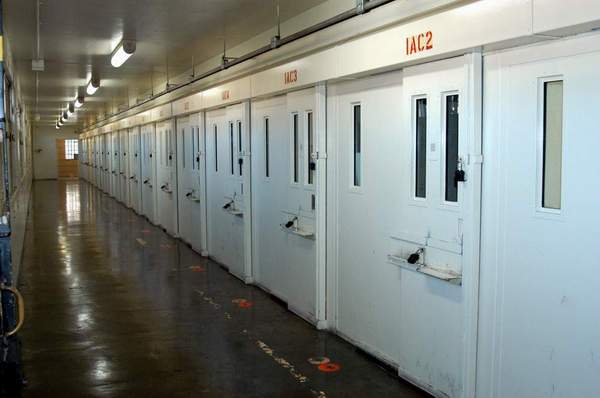
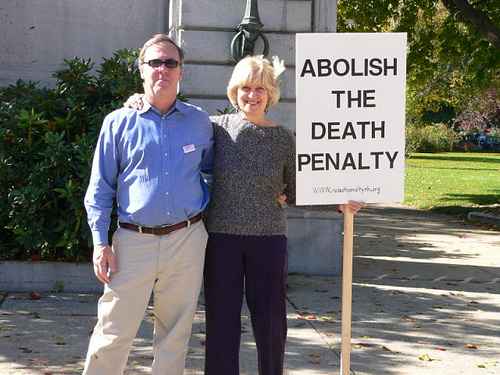
Death Penalty Abolished In Illinois
Last week, Governor Pat Quinn of Illinois signed into law SB3539, which repeals the death penalty in that state. This development is yet another in what appears to be signal a trend of moving away from capital punishment. Early last year we covered the American Law Institute’s declaration that the death penalty in this country has been a failure. Listeners may recall that the A.L.I. created the intellectual framework and justification for the current capital justice system. The movement away from this most final form of punishment seems to be due in large part to the public’s increased awareness about its inherent flaws such as great racial disparity on who gets executed and for what reason. Publicity around exonerations stemming from DNA evidence has also added to general awareness of procedural errors in the system.
Attorney Charles Hoffman:
- In 2003, Governor Ryan cleared out death row, he granted to the 167 men and women on death row and pardoned four.
- that prompted the legislature to pass a modicum of reform. The governor afterward assembled a commission that recommended 85 reforms.
- The legislature passed five or six. The legislature also created a death penalty reform study commission.
- One of the reforms was that all confessions in police custody had to be videotaped in murder cases.
- No matter what safeguards you implement, there’s no system that can prevent the conviction and condemning of an innocent person.
- Prosecutors around the state were asking for the death penalty in cases that weren’t death penalty prosecutions just so the state would bear the costs rather than the county.
- The legislature is cash-strapped and we were wasting millions and millions of dollars prosecuting capital cases when here in Illinois we have the very strict alternative of life without parole.
- Final Report: Death Penalty Legislative Study Committee. Illinois Death Penalty Reform Study Commission PDF
- After Governor Ryan cleared out death row in 2003, Illinois put 17 men on death row. 2 had committed suicide, which left 15 on death row when Governor Quinn signed the abolition bill and also granted sentence commutation to all 15. He commuted their death sentences to life without parole.
- As the problems with the death penalty have been exposed, the arbitrariness, the racism, as mistakes have gone into public consciousness, juries have been rejecting the death penalty.
- Illinois has become the 16th state to abolish the death penalty, following on the heels of New Mexico, New Jersey and New York. The federal government and the military do have it.
- The “deathbelt” in this country is in the South and Texas, and is just a legacy of slavery in this country.
- Most executions occur in former slave states. One obvious flaw of the death penalty, studies have shown the death penalty is most likely to be inflicted in a case when the victim is white and the odds go up even further if the defendant is black or Hispanic.
- Its very gratifying to get rid of this barbaric practice. I represented 35 men and women who were sentenced to death. I do the direct appeals. I’ve had one client executed, I’ve had one client go home.
- Some states have made illegal purchases of the drug. (lethal injection drug shortage)
- Some states are using just one drug, a massive overdose of a barbiturate.
- Life without parole is very draconian, it means there’s no prospect for rehabilitation.
Guest – Assistant Defender in the Supreme Court Unit at the Office of the State Appellate Defender, and member of the board of directors of the Illinois Coalition to Abolish the Death Penalty.
———


Communities Battle Against Gas Drilling To Protect Water, Way of Life
Environmental community groups from New York, New Jersey and Pennsylvania continue to band together and try to protect the Marcellus Shale watershed from natural gas drilling and hydraulic fracturing. The EPA has stated it will investigate how hydraulic fracturing impacts water supplies and water quality in New York State yet the drilling moratorium ends this June. The shale is believed to hold some of the world’s largest deposits of natural gas, and those that want to mine this resource say it will reduce dependence on foreign oil and boost the economy. However, many have shown this statement to be false as the natural gas from the United States is being sold to foreign countries such as Norway and France.
Ninety percent of the New York City’s drinking water comes from ground zero of where various oil companies want to drill into the Marcelle Shale for natural gas. Environmental and public health costs are enormous for each well. Every time a well is drilled, the companies use an estimate of 5 to 9 million gallons of water. Each time a well is fractured, it’s another 5-9 million gallons of water, a well can be fractured multiple times. Up to 275 different toxic chemicals are used in the process and after the well is drilled, there are millions of gallons of industrial waste, it’s essentially radioactive water. 40-70 percent of this water stays underground. The hydro-fracturing process has no federal regulating body. Some of the companies involved are Halliburton, Chesapeake Energy, Fortuna, and Talisman Hess.
Tracy Carluccio:
- My organization has been working on the issue for a few years to try to keep gas drilling from moving ahead.
- Right now there is a moratorium in place on the Delaware River Watershed. It took a year and a half to get that into place. Regulatory measures that are in place now for gas drilling are not doing their job.
- The bottom line is we’re facing an industry that wants to move ahead.
- The industry is very strong. There are international concerns.
- They’re backed by the government in many ways, they enjoy subsidies.
- This industry is going to move like heck to drill everyplace gas can be gotten.
- The Delaware River Watershed has its origins in the Catskill region of New York State.
- The east and west branches come together in Hancock, New York.
- 330 miles from Hancock to the Atlantic Ocean.
- The watershed is 13 thousand square miles and includes four states. It’s overseen by an agency that was born out of water wars.
- Back in the 1950s, all the states were suing each other about who would get water for development.
- In 1961, there was a Supreme Court decree and compact and President Kennedy signed a document that began the Delaware River Basin Commission. As a result of this compact, a large part of the Delaware River goes to New York City.
- There have been regulations federally (Represented by the Army Corp of Engineers) and regionally laid out by the Delaware River Basin Commission
- New York moratorium on gas drilling is tied to late June when there is supposed to be a new draft of the Draft Supplemental Generic Environmental Impact Statement on high volume hydraulic fracturing.
- In order to crack the rock to get at the gas is intrinsically polluting and there’s no way out of that.
- The question of how to stop it is tied to the scientific analysis free from bias.
- Without that bottom up movement, without that cry for government regulators, the industry would be moving ahead exactly as planned.
Guest – Tracy Carluccio, deputy director with Delaware Riverkeeper Network. Delaware Riverkeeper – a watershed wide advocacy program, Delaware Riverkeeper Network takes a strong stance on regional and local issues that threaten water quality and the ecosystems of the Delaware River and its watershed. In fact, Delaware Riverkeeper Network is the only advocacy organization working throughout the entire Delaware River Watershed.
—–
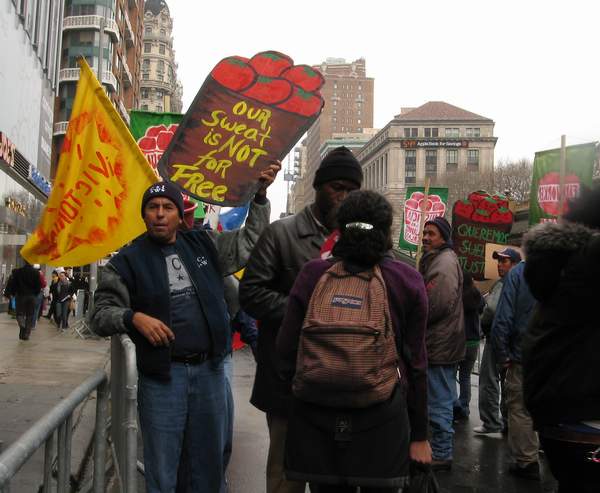
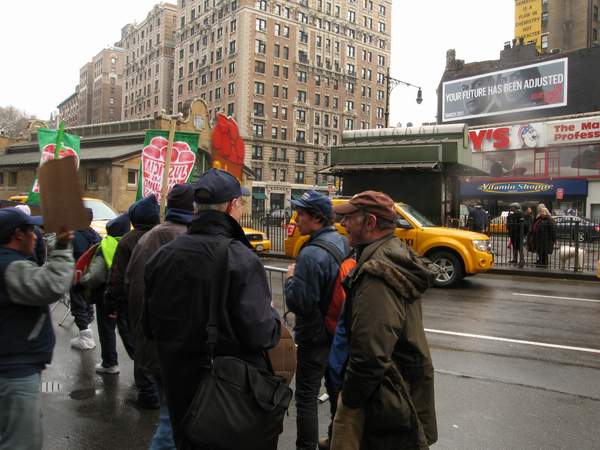
Farmworkers, Consumers Protest Trader Joe’s Demanding Fair Labor Standards for Farmworkers
Late last month, a busload of farm workers from Florida joined members of the NYC Community Farm worker Alliance at Trader Joe’s Upper West Side store. Men and women who pick tomatoes under very harsh conditions demand to be treated more humanely and with improved farm labor wages. Our own Michael Ratner was at the demonstration, we hear some of the interviews.
———————————————————————-
Civil Liberties, Criminalizing Dissent, FBI Intrusion, Guantanamo, Habeas Corpus, Human Rights, Prison Industry, Supreme Court, Targeting Muslims, Torture, Truth to Power
Podcast: Play in new window | Download
Updates:
—
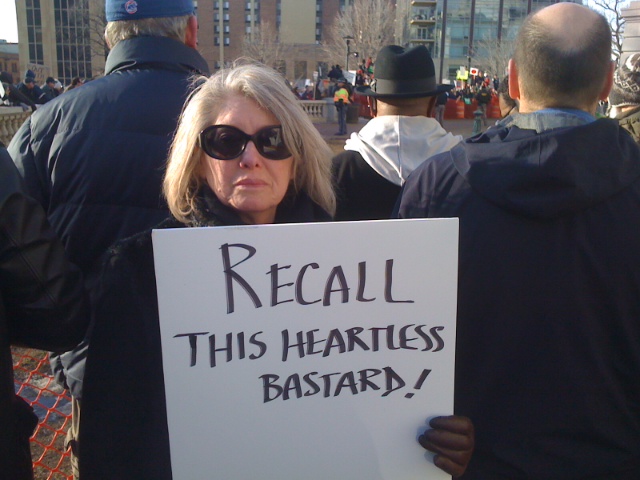

Wisconsin Labor Demonstrations Update
Organized labor is in the cross-hairs to be taken apart by the American elite. Last month, 10 thousand people continued a multi- day occupation of the Wisconsin State Capitol building while tens of thousands chanted outside. Meanwhile the country is gripped by the drama unfolding in Wisconsin and it has inspired unions in other states to move in solidarity. Among those states are Montana, Indiana, Ohio, Michigan, Pennsylvania and New Jersey. Listeners may remember that Wisconsin trade unions have already conceded to wage and benefit cuts. Now the state is voting to repeal Section 11170, the Public Employee Bargaining Chapter. Update: Wisconsin GOP Allows State To Fire Employees For Strikes, Walkouts
Attorney Lester Pines:
- Governor Walker is clearly a stocking horse for the far right wing of the Republican Party.
- I’m not surprised at his behavior, he behaved this way as a Milwaukee County executive.
- I told people he was going to try to repeal section 11170 which is the Public Employee Bargaining Chapter
- What’s at stake is an attempt by the governor and the legislature to strike at the heart of the Wisconsin tradition of organized labor.
- Public employee bargaining has been in Wisconsin for 50 years. This is an attempt to tear apart generations of how Wisconsin operated.
- On a federal level, this is an attempt to wipe away outside groups that democratic and progressive candidates.
- Wisconsin has a bi-annual budget. The legislation is part of budget repair bill. In that legislation is a bill to eliminate all collective bargaining for all municipal and school district employees as well as for state employees.
- There will be no bargaining if this bill passes. The only thing that can be bargained with is wages.
- The bill also imposes a cap on wages. These are designed to essentially make it impossible for public employee unions to function in any meaningful way.
- Scott Walker didn’t talk about what he would actually do.
- If we look at the mass demonstrations in Madison. These are the biggest demonstrations I’ve ever seen here.
- Impeachment is impossible because Republicans control the legislature and Senate, however he can be recalled.
- The Democrats can’t be arrested in a criminal sense,
- Governor Scott Walker has reignited the progressive movement in Wisconsin.
- Until you get these Republicans out of office they’re going to do a lot of damage. They’re nihilists. They care nothing for public services. They care only for what their corporate puppeteers want them to do.
- It looks like this whole anti-public union movement was actually planned out amongst all these new governors.
Guest – Labor attorney Lester Pines, in practice since 1975, he leads the Litigation area, concentrating in civil trials, criminal defense, labor & employment, and business. A Fellow in the American College of Trial Lawyers, Mr. Pines is a highly respected civil and criminal litigator who has appeared in courts throughout Wisconsin and litigated federal matters in Wisconsin, Illinois, Iowa, Ohio and New York.
————————–
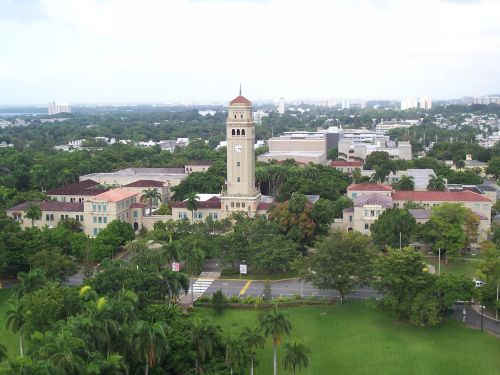

Human Rights Crisis Continues In Puerto Rico
More than a year ago nearly 100 thousand people took to the streets of San Juan, Puerto Rico to protest the lay off of about 17 thousand public employees. The demonstration shut down all state-owned enterprises including the island’s schools and colleges. Two days before that strike the governor passed a bill aimed at dismantling the Bar Association. Protesters were warned that if they stopped commerce, particularly the docks and airports, that action would be sanctionable to federal law. Now, as human rights violations continue, as students and faculty demonstrate against dismantling of progressive curriculum and tuition hikes. ACLU of Puerto Rico, “Human Rights Crisis in Puerto Rico: First Amendment Under Siege.” Law and Disorder Interview with Judy Berkan October 2009
Attorney Judy Berkan:
- Wholesale attack on institutions of Puerto Rican society where any dissent could be lodged.
- The Puerto Rican Bar Association, a real forum for those without a voice. Attacks have come to the Bar Association, elimination of mandatory Bar membership and imposed draconian restrictions upon the Bar Association. They took away a great deal of our funding.
- The president of the Puerto Rican Bar Association was jailed for speaking out against a lawsuit that could take away life insurance from poor lawyers.
- There’s a one month prohibition on leafleting and expression in the University of Puerto Rico.
- The closing of the legislative chambers. Right now there is a US Department of Justice investigation and talk of a trusteeship of the police department here.
- The use of the tactical operations of the police to repress dissent has been intensified.
- All of our public spaces are being closed off to legitimate dissent, while people engaged in peaceful dissent are being attacked.
- Austerity: Part of the remedy of the economic crisis there was an increase in tuition of 800.00. But much more at stake.
- More than that there is question of the vision the University of Puerto Rico will take in the future.
- The emphasis appears to be on privatization as it is throughout the government. We been suffering these programs since 2009.
- We were the guinea pigs. There’s more violence here, if we occupied the state house here, we would’ve been met with pepper spray, gas and beatings as we were when we attempted to demonstrate outside the state house last June.
- The economic programs are really the model that’s being used by Republican governors in the US
- The University situation is really wallowing in the wind without a real solution.
- The Bar Association and their presence is very crucial to public debate in Puerto Rico.
- I think people are getting tired, we do have 2 more years left of this administration.
- The police department is still in the hands of a former FBI agent who has openly encouraged violence against protesters. We have a raging crime rate.
- What’s distressing for all of us here who care about these matters is the media black out in the United States.
- Are we training people to be managers at McDonald’s or are we training people to think about the future of Puerto Rico?
Guest – Attorney Judith Berkan, is a partner in the San Juan law firm of Berkan/Mendez. She specializes in government misconduct litigation and employment discrimination cases. Berkan worked as an attorney in New Haven, Connecticut before going to Puerto Rico as the staff attorney for the Puerto Rico Legal Project of the National Lawyers Guild, now the Puerto Rico Civil Rights Institute. For twenty-seven years, she has been teaching, primarily in the Constitutional Law area, at the Inter American University Law School in San Juan, Puerto Rico.
A frequent speaker and author of many articles on civil rights issues, she was the President of the Human Rights Commission of the Puerto Rico Bar Association in the mid-1990?s and a member of the Commonwealth Supreme Court’s task force on gender discrimination.
————————–

Left Forum 2011
The 2011 Left Forum convenes this Spring, March the 18 to the 20th. This is the largest annual conference of a broad spectrum of left and progressive intellectuals, activists, academics, organizations and the interested public. Conference participants come together to engage a wide range of critical perspectives on the world, to discuss differences, commonalities, and alternatives to current predicaments, and to share ideas for understanding and transforming the world.
Guest – Stanley Aronowitz Distinguished Professor of Sociology at CUNY Graduate Center, where he is Director of The Center for the Study of Culture, Technology and Work. He has taught at Staten Island Community College, University of California-Irvine, University of Paris, Columbia University, and University of Wisconsin.
——————————————————————————————–
Civil Liberties, Criminalizing Dissent, FBI Intrusion, Gaza, Human Rights, Surveillance, Targeting Muslims
Podcast: Play in new window | Download
Updates:
—-
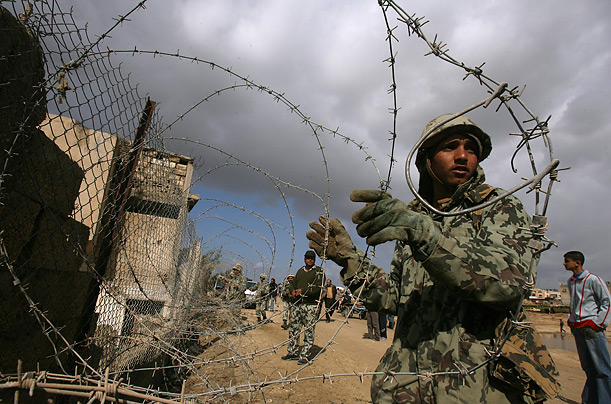
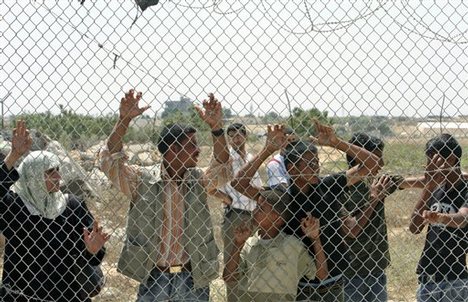
Middle East Protests – Israel / Palestine
Uprisings have continued to sweep through the middle east from Tunisia, Egypt, Libya, Bahrain, Yemen, Iran, Iraq and China. Economic hardships and desperate living conditions are partly the cause for some of the mass protests. In one article describing the Wisconsin protests, the journalist wrote, there were many voices this last month that raised the cry, “We are all Egyptians!”
Governments are said to be scrambling to squelch popular dissent. How will these protests begin to reshape countries in the middle east and and what government structures are standing by to replace decadent tyrannies and corrupt monarchies? How are Palestinians in Gaza and the West Bank responding to the massive dissent in nearby Arab countries?
Ali Abunimah:
- The events over the past weeks have been historic and we still don’t know how they’re all going to play out.
- The aspirations of Tunisians, Egyptians, Libyans, Jordanians, Palestinians are very clear.
- What remains to be seen is if they succeed in completing the revolutions. There is a strong counter-revolutionary push, not just from old regime elements but also from the United States.
- The mass uprising was sudden, but its important to know that there were Egyptian activists risking their lives for many many years to lay the ground for the uprising.
- The upper echelons of the Army are fully implicated in the old regime.
- You have a parade of Americans going to Egypt trying to minimize any shift in the region away from the Israeli-American axis and more into an independent orbit.
- The only guarantee is the continued mobilization of Egyptian people, of Egyptian workers.
- One of the myths in the American media is that this uprising is entirely about internal domestic issues.
- The Rafah crossing into Palestine needs to be open permanently, the situation at the border normalized.
- Egypt’s revolution and Israel: “Bad for the Jews” Ilan Pappe, The Electronic Intifada, 14 February 2011
- The view from Israel is that if they indeed succeed, the Tunisian and Egyptian revolutions are very bad. They make the Israeli occupation and apartheid policies in Palestine look like the acts of a typical “Arab” regime.
- The war in Gaza probably could not have been carried out without Egyptian complicity.
- In Palestine, the complete death of the peace process. The Palestine Papers – revealed by Al Jazeera.
- You can’t have functioning democracy and normal politics under Israel’s occupation.
- Your rights are not given to you from above, you have to fight for them.
Guest – Ali Abunimah, a Palestinian American journalist and author of One Country, A Bold Proposal to End the Israeli-Palestinian Impasse and a co-founder of The Electronic Intifada, a not-for-profit, independent online publication about the Israeli-Palestinian Conflict. Born in Washington D.C., he spent his early years in the United Kingdom and Belgium before returning to the United States to attend college.
—–
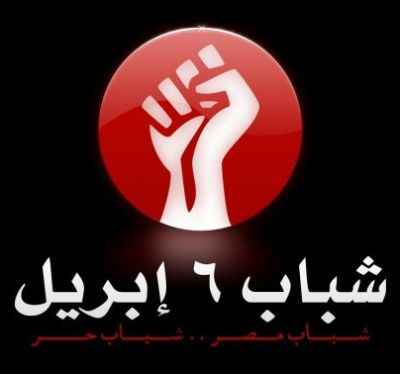
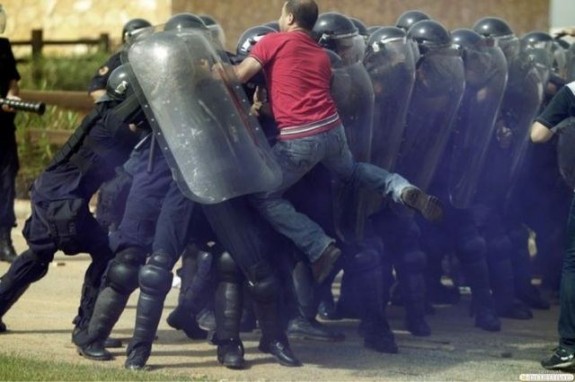
Cracks In The Neo-Liberal Empire
Political unrest in North Africa continue to ripple through the Middle East with some of the biggest anti-government demonstration yet in Bahrain. Meanwhile, the protests in Libya have turned deadly as the regime’s military has killed hundreds of demonstrators. New York Professor of Middle Eastern and Islamic Studies and History Zachary Lockman joins us with an analysis on the mass protests. In Egypt, Lockman says the old political parties in Egypt have no credibility.
Professor Zachary Lockman:
- Egypt: There were huge labor strikes going back to 2008. One of the groups that launched on January 25, called itself the April 6 youth movement – called itself that because there was supposed to be a big general strike of textile workers in 2008.
- The tremendous demand from Egyptians which help fuel the uprising, for some kind of change to the neo-liberal economic policies that Mubarak regime implemented 20 years ago.
- Egypt back in the 50s and 60s under the Nassir government carried through a series of social reforms.
- The largest estates held by the largest land owners were broken up, and millions of landless peasants even if they didn’t get land, they could farm some land and have reasonable security.
- Those kinds of things were rolled back in the 1990s under pressure from the IMF and the World Bank and with the approval of US government.
- Which means these farmers were kicked off the land in large number and ended up having to move to the cities in search of work for meager wages.
- Much of the public sector was privatized at fire sale prices to cronies of Mubarak.
- This is an opportunity when millions of Egyptian workers see an opportunity to create their own independent trade union movement. One doesn’t want to downplay the heroism of the young people who took to the streets on January 25.
- Mubarak was told to go by the generals who were told to preserve as much of the regime as possible in the face of this popular uprising. The generals now running Egypt are products of the Mubarak regime. The danger is that we’ll have the Mubarak regime without Mubarak.
- There is a new independent federation trade union being established in different industries. (Egypt)
- If there is something that approaches a more representative, democratic government, that government will be less likely to take orders from Washington in the way that Mubarak was very happy to.
- We’ve been waiting for something like this for decades, and in Egypt’s case for 30 years.
- It opens up dramatic new possibilities on a world scale. That boogieman of Islamic threat used to justify autocratic regimes which has been used across the region, is still there but as we’ve seen in Egypt and elsewhere, it’s time to put it aside.
- Since the 1970s, Saudi Arabia which has been on the defensive of more nationalist Pan Arab forces asserted it’s influence to buy friends and intimidate enemies and has been the bulwark of this conservative autocratic origin in the region.
Guest – Professor Zachary Lockman, New York Professor of Middle Eastern and Islamic Studies and History. He is the author of many books including Contending Visions of the Middle East: The History and Politics of Orientalism and “Explorations in the Field: Lost Voices and Emerging Practices in Egypt, 1882-1914.”Background: My main research and teaching field is the socioeconomic, cultural and political history of the modern Middle East, particularly the Mashriq. Under the influence of the “new social history” and “history from below” movements of the 1960s and 1970s, I did my doctoral dissertation on the emergence and evolution of a working class and labor movement in Egypt from the late nineteenth century until the Second World War; it was published in 1987 in a book co-authored with Joel Beinin. Harvard University, Ph. D., 1983.
———————————————————
Civil Liberties, Human Rights, Truth to Power
Podcast: Play in new window | Download
Updates:
—-
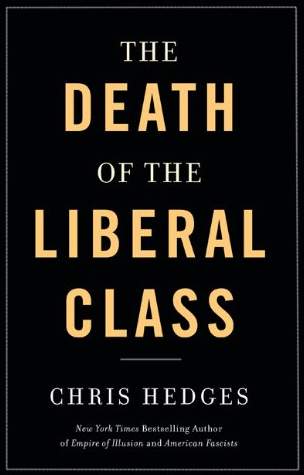
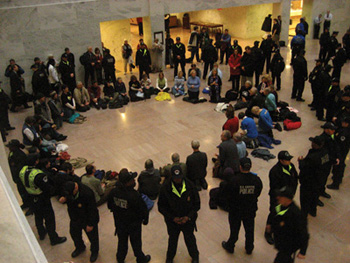
Chris Hedges – Death of the Liberal Class
We are pleased to have with us returning guest Chris Hedges. We talk with him about his new book Death of the Liberal Class. This scathing narrative cuts to heart of how the corporate state has claimed the liberal class as one of its victims. Chris calls the liberal class ineffectual, out of touch with reality by not acknowledging that corporations have wrested power from citizens. The death of the liberal class means there is no check to a corporate apparatus designed to enrich a tiny elite that plunder the nation. The book lists the pillars of the liberal class that have been bought off with corporate money such as the media, the church, the university, the Democratic Party, the arts, and labor unions. Chris describes these harsh reality and sets them against the functions of a healthy liberal class in a traditional democracy. Chris Hedges articles.
Chris Hedges:
- The pillars of liberal establishment, liberal religious institutions, labor, public education, esp. public universities, culture, the press and finally the Democratic Party, which made incremental or piecemeal reform possible. – which watched out for the interest and the grievances of those outside of the narrow power elite – no longer function.
- The term neo-liberalism is a reconfiguring of what it means to be a liberal in a democratic society.
- We have figures like Bill Clinton, Barack Obama, Pelosi and others that continue to speak in those values but betrayed everyone of those values.
- The subservience to Wall Street, the slavish catering to the permanent war economy, the failure to defend basic civil liberties, including habaes corpus. All of these have been embraces so that a liberal is ultimately on the core structural issues indistinguishable from a conservative.
- The liberal class and liberal institutions are traditionally allowed to function in a capitalist democracy because when there is a crisis within the society the perform a formal channel or mechanism within power structure in which injustices can be alleviated.
- The New Deal: perfect example of how the liberal class functions.
- They have corporatized all of the pillars of the liberal establishment.
- What kept the liberal class honest were these populist movements which held fast to moral imperatives.
- Everything shifts in American society because you enter a culture of permanent war psychosis.
- With the gradual coup, the corporations have carried out in the United States beginning with Reagan, accelerated by Clinton and Bush, and certainly further by Obama, we’re left powerless, we have no mechanism to fight back.
- They understood that people were not moved to act primarily by fact or reason but could be manipulated through emotion. This is the result, we live in a society utterly saturated with lies.
- The liberal class has been reduced the status of courtiers.
- The corporate state is rapidly reconfiguring society into a form of neo-feudalism, where you have these speculators on Wall St earning 900 thousand dollars an hour, where you have families of four barely able to feed and sustain themselves and forget the ability to pay medical bills.
- The elite institutions of education which charge astronomical sums essentially provide education for the elite, while we gut public education.
- People are trained to work as cogs in the corporate structure. Inner city schools are turned into boot camps, that’s what charter schools are about, along with the ability to break teacher’s unions.
- Everybody has there place, it solidifies a caste system. There’s no hope for escape. We are fed endless stories of few exceptions, to somehow make us think that we’re responsible for our own predicament.
- It’s one of the most vicious things that have been visited upon the working class.
- The liberal class is tolerated by the power elite because it castigated radicals. The figure that liberals hate most is not Glen Beck, it’s Noam Chomsky because calls out their cooperation with the power elite.
- When the liberal class is discarded, that is how we can stand by passively as 3 million people are forced from their homes, through foreclosures and bank repossessions last year, and another 3 million this year and do nothing.
- As these grievances mount, there is no mechanism within the structures of power or traditional institutions by which these injustices can be ameliorated.
- They become expressed in these very frightening proto-facist movements, such as the Tea Party or demagogues like Glen Beck or Sarah Palin who give legitimacy to this anger, rage and sense of betrayal.
- Part of their anger is directed at government and cleverly deflected away from Wall Street but at liberals. Not wrongly, the hypocrisy of the liberal class, is readily apparent from those on low end of the economic spectrum.
- I think we should begin to engage in acts of civil disobedience because we are the last thin line of defense between a complete collapse of society.
- The only thing we have left are physical acts of non-violence. I think its extremely important that we stop living with the illusion that we’re going to reform the Democratic Party.
Guest – Chris Hedges, American journalist, author, and war correspondent, specializing in American and Middle Eastern politics and societies. His most recent book is ‘Death of the Liberal Class (2010). Hedges is also known as the best-selling author of War is a Force That Gives Us Meaning (2002), which was a finalist for the National Book Critics Circle Award for Nonfiction. A quote from the book was used as the opening title quotation in the critically-acclaimed and Academy Award-winning 2009 film, The Hurt Locker. The quote reads: “The rush of battle is often a potent and lethal addiction, for war is a drug.”
———–
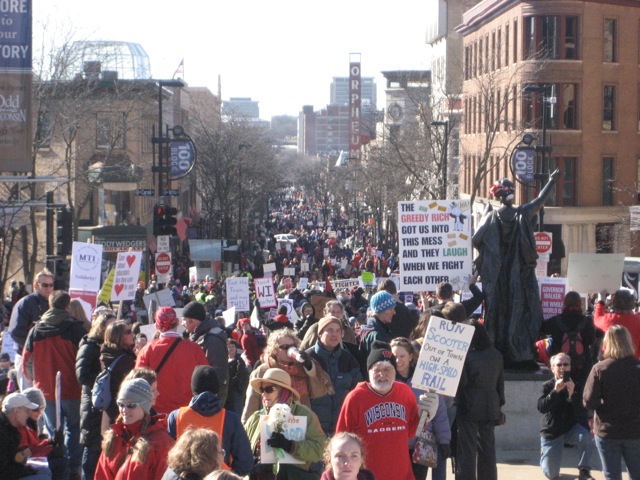
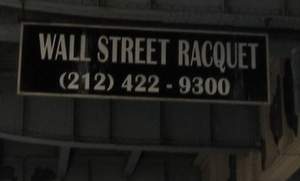
Federal and State Budget: Economic Analysis
We welcome returning guest Economics professor Rick Wolff. A lot of his current writing and lectures can be found at Rdwolff.net. In one of his latest articles, The Revenge of Trickle Down Economics: Differences between Democrats and Republicans, he says both are committed to a broken, corrupt system. Rick also points out that the US government plans to spend about 3.5 trillion dollars from the federal budget to shore up a dangerously slumped economy while collecting 2 trillion dollars in tax revenue – which will leave a deficit of 1.5 trillion.
Meanwhile the Democrats and Republicans debate over spending cuts that are around 40 to 60 billion. Rick says the debate is inconsequential, when the federal budget’s projected deficit of $1.5 trillion will carry an annual interest cost of $40-60 billion. We get an update on the budget, the current economic conditions in the United States and discuss possible alternatives with Professor Rick Wolff.
Professor Rick Wolff:
- As the government continued to borrow in record amounts never before seen except in war time. The question was never asked, if the government is borrowing like crazy how it going to manage to pay the interest costs.
- Here we are a couple years later and the problem has arrived. The government now faces rising costs to cover this debt, to free up money, cut spending, lay off people, and cut programs. That money is given to the people who lent the money.
- In the United States it’s mostly large corporations and wealthy individuals.
- The money they lent to the government, let’s remember is the money the government didn’t tax from them.
- Then you see the debate of who do you cut.
- What’s off the table is the question of taxing the people who’ve become wealthy in the last 30 years. Who have profited from the stock market booms, and the stock market recoveries. You might say those folks owe a little bit to bail us out of a national crisis.
- In every city, the economic crisis is the key. Employed people don’t earn income tax because they don’t earn income. People who are losing their houses aren’t buying very much so the sales tax goes down.
- The governments either have to tax corporations or the rich, OR they can start cutting.
- What you have in Wisconsin is the extreme version of that. Indiana, Ohio, Tennessee, New Jersey
- The decision to cut is a decision taken without debating the alternative that’s available which is to tax the wealthy and the business community.
- Taxing the rich: You’d only have to bring the taxes back to where they were, not raise them above any historic level. The greed and the power of the corporations is so obvious, that they’ve gotten not even to be debated.
- The elected officials of this country act as if it weren’t there.
- During WWII the corporate sector contributed 50 percent more in taxes than what individuals were asked to pay. Now, individuals pay four times more into the federal government than the entire corporate income tax.
- All the Republicans and Democrats are debating is how much and who to cut.
- But the decision of whether to cut is always there. The American people are finally discovering that what they thought happens elsewhere, what they thought couldn’t happen here has arrived.
- We have two political parties performing an obvious theater that has no relevance to the actuality that they’re dealing with.
- There is no disagreement on the larger picture which is bailout the corporations, don’t tax the rich, put the burden on the mass of people, keep borrowing like there’s no tomorrow.
- It’s a 30 year process we’re coming to the end of, of squeezing people and moving wealth upward. When you add to that a sudden serious crisis, you’re pushing the people in the middle and the bottom over the edge.
Guest – Richard D. Wolff is Professor of Economics Emeritus, University of Massachusetts, Amherst where he taught economics from 1973 to 2008. He is currently a Visiting Professor in the Graduate Program in International Affairs of the New School University, New York City. He also teaches classes regularly at the Brecht Forum in Manhattan.
—————————————————————-
Afghanistan War, Civil Liberties, Human Rights, Truth to Power
Podcast: Play in new window | Download
Updates:
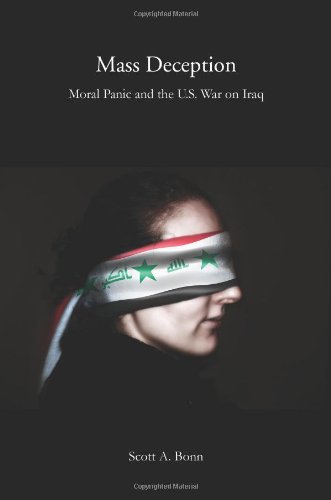

Mass Deception: Moral Panic and the U.S War on Iraq – Dr. Scott Bonn
The attacks of 9/11 led to a war on Iraq, although there was neither tangible evidence that the nation’s leader, Saddam Hussein, was linked to Osama bin Laden nor proof of weapons of mass destruction. How then was propaganda and distortion used to garner support for the invasion of Iraq? Dr. Scott Bonn has a few theories, in his new book, Mass Deception: Moral Panic and US War on Iraq. Bonn introduces a unique, integrated and interdisciplinary theory called “critical communication.” We talk more with Scott A. Bonn, assistant professor of sociology at Drew University. Dr Bonn teaches courses in criminology, deviance and research methods.
Professor Scott Bonn:
- Moral Panic: a criminological concept established by Stan Cohen. An exaggerated public response and policy initiative, the media go along for the ride.
- The crux of it is that the people become almost dependent on the elites.
- I was listening to the war drums pounding in 2001, 2002 and early 2003. “Timing is everything, from a marketing view you don’t introduce new products over the summer.” – President Bush, White House Chief of Staff
- Terminology entered the public airwaves, mad men, mad dog, evil doers, tied to imagery of 9/11.
- I looked at the rhetoric of the Bush Administration, and then I looked at public opinion polls. Public opinion mirrored the rhetoric.
- “Critical communication” has its foundation in Chomsky’s notion of manufacturing consent, and looking at the research of during the dawn of the Nazi party.
- In the modern world, oppression can seem subtle, attractive and entertaining. Music, film and poetry actually can be forms of oppression if there are lies being disseminated.
- Part of my book is that we don’t get fooled again. Let’s be critical consumers.
- Let’s not drink the tainted kool-aid of hatred and fear without questioning what the motives of the server are.
- 90 percent of the world’s media outlets are controlled by six conglomerates.
- There’s ample evidence that “they” knew there were no stockpiles of mass destruction.
- I worked in advertising, I worked at NBC, I was actually vice president at NBC. It was exactly that experience that gave me a first hand view of exactly how news is created. It’s only news because some who has the power decides that it is.
- As a society were not critical, scrutinizing and intellectual. There’s a tendency to passively accept what we’re told. Axis of Evil was reducing something that was highly complex, making it a lie.
- The next time we’re told we must respond to an iminent threat and we must act on it, we must ask why?
- Is there any objective indication that there is a threat?
Guest – Dr. Scott Bonn, Assistant Professor of Sociology at Drew University in Madison, New Jersey. He combines the knowledge and skills of an academic scholar with more than twenty years of senior-level corporate experience as an advertising and media executive. Bonn has developed a unique, integrated, and interdisciplinary theory called “critical communication” to explain how and why political elites and the news media periodically create public panics that benefit both parties. Facebook link
—
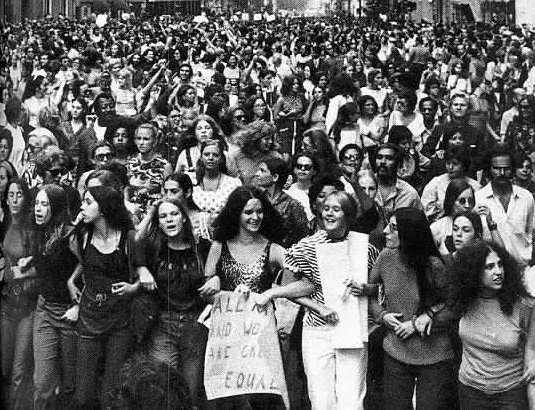
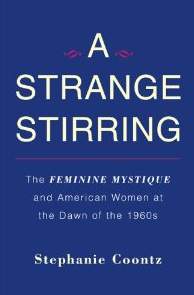
A Strange Stirring: The Feminine Mystique and American Women at the Dawn of the l960s
A Strange Stirring: The Feminine Mystique and American Women at the Dawn of the l960s” is the title of Stephanie Coontz’s new book. It’s based on postwar gender roles and nearly 200 interviews with women and men who read Betty Friendan’s The Feminine Mystique in 1963. The Feminine Mystique is a passionate account of “the problem with no name” the malaise, emptiness and frustration afflicting white middle class wives and mothers in a time of post war abundance.
Stephanie Coontz:
- There were so many myths of who Betty Friedan was and she contributed to it herself.
- Daniel Horowitz did a book her own political history. She was a star psychology student at Smith.
- She has already developed her critique of Freudiasim which was so prevalent those days.
- She didn’t invent the “feminine mystique.” Physicians had a name for it, the housewives syndrome.
- You have been denied access of any sort of meaning in your own life.
- The Feminine Mystique sold 3 million copies.
- I have 188 interviews with men and women who read the book. I had to winnow it down to 188 because I kept getting calls and emails from people who swore that they read the book.
- When you went to college in the 1920s you were already defined in your role as a woman.
- What’s wrong with me that I don’t feel more grateful for my priviledges?
- Telling yourself that you don’t have the right to be unhappy, doesn’t solve it, it turns it in to that kind of depression. Incredible discrimination against working women. You could get fired if you got married, turned 30 or were in the airline industry.
- Stay at home housewives didn’t have rights either, there were only 8 states that recognized a wife’s interest in the property or earnings that her husband accumulated.
- One of the big triumphs of feminism is that much of Friedan’s book is so dated.
- Today, young women in their twenties in metropolitan areas out earn men because they have more education.
- Young men as you know are falling behind. Cross cutting currents of inequality that are much more complex.
- The women that are having the most difficult time are the women that would prefer to be homemakers but have had to take a low quality job and whose husbands do not help out at home.
- The happiest women are the ones that prefer to work, have a high quality job and a husband that helps out at home.
- There are things in Betty Friedan’s book I find repellent. I find her failure to deal with her own elitism very disconcerting, but she is not a me-first individualist.
Guest – Stephanie Coontz, teaches history and family studies at The Evergreen State College in Olympia, WA. She also serves as Co-Chair and Director of Public Education at the Council on Contemporary Families, a non-profit, nonpartisan association of family researchers and practitioners based at the University of Illinois at Chicago. Her work has been featured in many newspapers such as The New York Times, as well as scholarly journals such as Journal of Marriage and Family.
—————————————————–






















